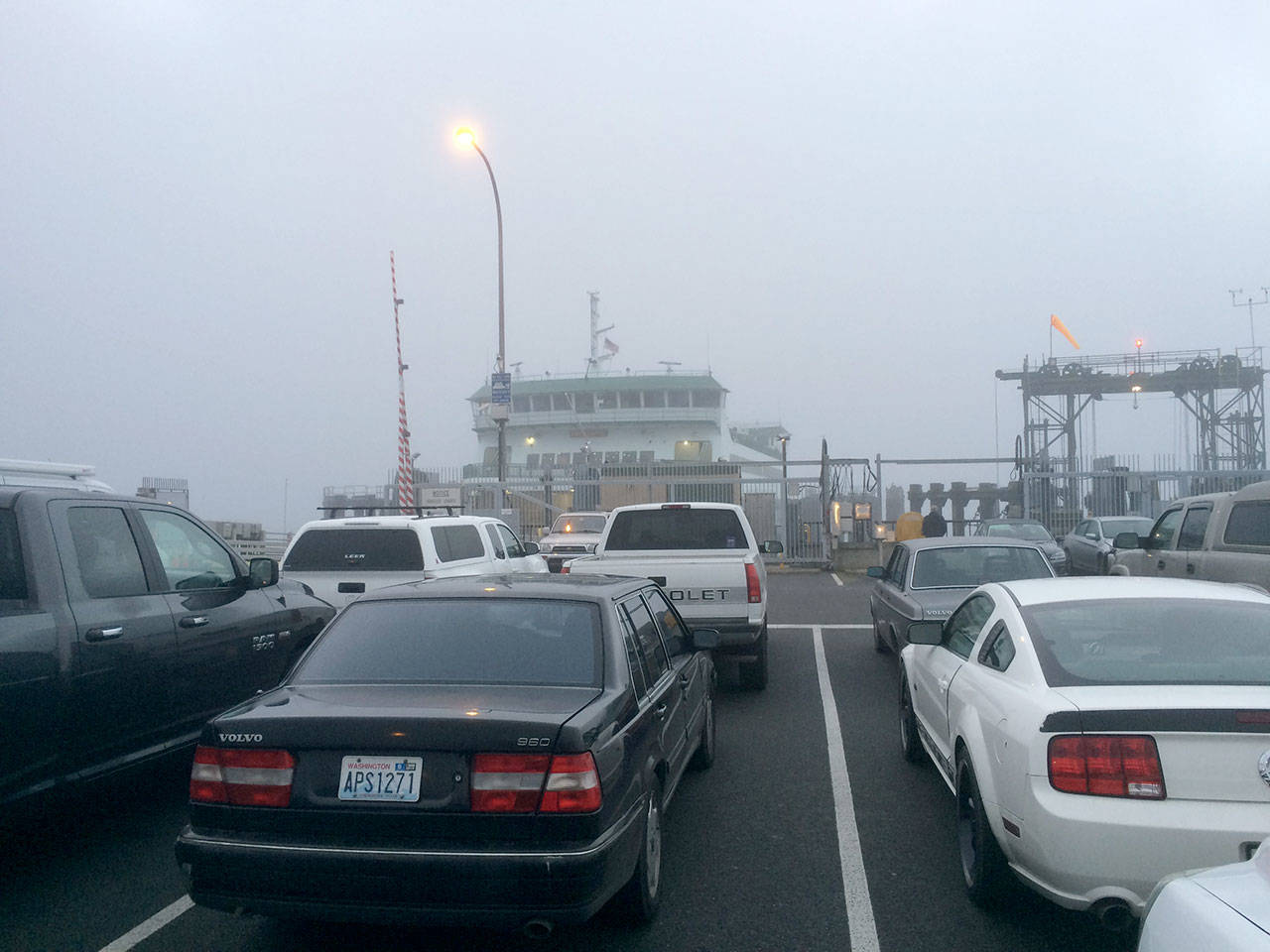PORT TOWNSEND — Jefferson County commissioners have identified several issues that impact the Port Townsend-Coupeville route and voted unanimously to send a letter expressing their concerns to Washington State Ferries.
“I wanted to be inclusive but not too far reaching,” said Commissioner Kate Dean, who wrote the first draft of the correspondence.
Commissioners approved sending the letter during their Monday meeting.
The deadline for comments on State Ferries’ draft 20-year long-range plan is Thursday.
Dean made a request for increased service on the Port Townsend-Coupeville route sooner than the draft long-range plan allows.
The letter requests two additional hours of service per day in 2019, extending the two-boat service season sooner than 2028, beginning two-boat service before Easter and ending it after Thanksgiving, and providing two-boat service for a three-week period around holidays at year’s end.
Modifying Keystone Harbor or relocating the ferry landing to accommodate larger vessels was a point of discussion.
The 64-car Kwa-di Tabil class ferries have run aground at Keystone Harbor about once every three years, including during the busy Port Townsend Wooden Boat Festival weekend in September.
Dean wrote that this presents “an ongoing safety risk for passengers and crews, a risk of serious, costly damage to the vessels and major disruption to travel for residents, visitors and businesses in Jefferson County.”
Commissioners also requested reducing carbon emissions throughout the ferry system, with a focus on electrifying the fleet. This would also help reduce noise for the benefit of southern resident orcas.
Dean also supports installing solar panels that would aid shellfish production by reducing carbon absorption, which results in ocean acidification affecting one of the county’s most important economic sectors.
Dean said that car traffic is reaching capacity on the Port Townsend route, with an increase in pedestrian and bicycle ridership.
She felt it is important to connect Jefferson Transit and other transit authorities when considering schedule changes and asked that the Department of Transportation modernize its digital interface.
“Reliable service is one of their main goals,” Commissioner David Sullivan said. “To ensure reliable service, one or two additional 64-car ferries should be built. Thinking through all the issues of Keystone Harbor, I would be surprised if that went quickly or smoothly.
“The issue is that 64s can pinch-hit on other routes, but the bigger ones can’t come here. So for our reliability, they need to be there. They are marketable boats. If everything changes, they can be sold.”
Commissioner Kathleen Kler said she was surprised at some of the comments she heard at the community ferry meeting in April.
“I was dismayed at some of the limited understanding of how important this route was. They didn’t understand how or why we had commuters. That emphasis on reliability and more service, I can’t say it enough.”
Tom Thiersch, Ferry Advisory Committee chair, told the commissioners that building more small boats is a non-starter.
“I don’t see them willing to consider that,” Thiersch said. “That has not been brought up in any of the planning conversations.
“However, we do have three of these small vessels, and the first one built, the Chetzemoka, is down on the Point Defiance route, semi-permanently assigned there. It might be more palatable for the ferries to reassign Chetzemoka. Have this route be its preferred route, and take it away if there is an emergency as a relief vessel status. I think that’s doable.”
Thiersch said that larger ferries are able to service the Point Defiance route because there is not an issue with harbor constraints.
“We’ve said expanding or relocating the Keystone Harbor to make it more navigable is the key to having reliability of service regardless of what size boat serves the route. Might as well make it more accessible by making it service the mid-size boats, the 144s.”
Thiersch pointed out that Kingston is preferring to downsize its boats, opting for three small boats rather than two larger ones because of highway congestion issues.
“With 202 cars coming off all at once, it really clogs up their road because they haven’t had any road improvements,” he said. “It’s a regional, domino effect.”
As for prioritizing vessel replacement, he said the plan does not address funding and said it is up to the Legislature to find the money once the plan is approved.
Thiersch said a new boat costs an estimated $1 million per car space.
For more information and to comment on the Washington State Ferries long-range plan, visit www.WSFlongrangeplan.com.
________
Jefferson County Editor/Reporter Jeannie McMacken can be reached at 360-385-2335 or at jmcmacken@peninsuladailynews.com.

